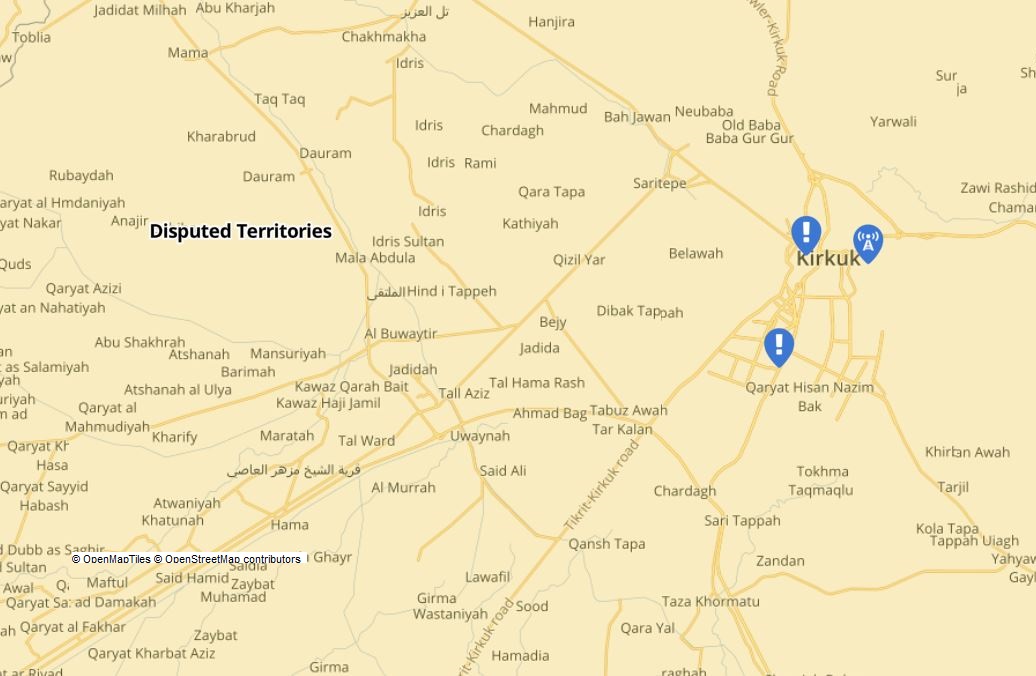1.2K
Kirkuk
- On Sunday, January 30th, ISIS (Da’esh) terrorists launched a massive attack on the Iraqi federal police near Rashad district of Kirkuk, killing two officers and wounding two. Meanwhile, senior Iraqi and Kurdish security officials met near the Kurdistan region’s Chamchamal district, discussing joint operations in four provinces in the disputed territories. Last week Peshmerga officials said the formation of the new combined brigades is awaiting salary arrangements from Baghdad to deploy in the disputed territories.
- French Ambassador to Iraq, Eric Chevalier, visited Kirkuk on February 1st and held a meeting with acting governor Rakan al Jabouri. In a press conference, Chevalier said France aims to help Kirkuk in reconstruction and help investments. Chevalier also visited the Kurdistan Region and met with top Kurdish officials. Currently, Iraq’s Ministry of Electricity, Kirkuk’s North Oil Company (NOC), and a French company are in talks for building a solar power plant, providing 250 megawatts of electricity. Meanwhile, the State Organization for Marketing of Oil (SOMO) released January statistics of Kirkuk’s oil export and sales. According to the report, Kirkuk grossed 238,440,371 million US dollars, an increase compared to December exports due to climbing oil prices. However, Kirkuk exported 150,000 oil barrels less in January than in December of 2021.
- In the city of Kirkuk, unknown shooters stormed the home of an anti-terrorism Kurdish officer named Deler Gazi in the Rizgari neighborhood. Separately, school guards held a protest, demanding hires after a “decade of working as a contractor.”
- Kirkuk’s acting governor, Rakan Saed al Jabouri, formed a “consulting committee:” to dispute the senior positions in Kirkuk by 33% ratio on the components, angering the Kurds, since they form a historical and present majority in the province. Since October 16th, 2017, Kurds have lost dozens of posts in the administration and security forces due to renewed Arabization policy by Baghdad. Last week, al Jabouri removed the head of Kirkuk’s Human Rights Commission by an Arab, raging the Turkmen population. The post was run by a Kurd who was removed in 2017.
Shingal (Sinjar)
- On the night of Tuesday, February 1st, dozens of Turkish warplanes struck Kurdish areas in Syria and Iraq, including thirteen places in Shingal. As a result, several compounds and security posts of the Sinjar Resistance Units (YBS) were destroyed amid unknown casualties among the force. The following day, a group named “Ahrar Sinjar” claimed a rocket attack on the Turkish military base in Bashiqa. The group said, “We have exhausted all stages of restraint amid the central government’s failure to protect our people and our city from the repeated Turkish attacks,” threatening of further attack on Turkish “occupation” unless mediations “Put an end to the continuous Turkish aggression.” On Thursday, several teachers protested and launched a strike due to property damages on the schools by the Turkish attacks, demanding the Iraqi government stop Turkey. After suffering a genocide by Da’esh in 2014, the Yazidi Kurds face constant airstrikes by Turkey under the pretext of the presence of the Kurdistan Workers’ Party (PKK).
Makhmour
- On Tuesday, two guards were killed and dozens of civilians were injured by Turkish airstrikes, targeting the Makhmour Refugee Camp holding Kurds from Turkey. The camp administration told dozens of civilians. Despite being denounced by the Iraqi government, Turkey continues targeting the United Nations-recognized refugee camp.
- On Thursday, Da’esh terrorists attacked the Peshmerga forces near Makhmour district, wounding two, but the attack was foiled.
Khanaqin
- Locals protested the increase of generators fees in Khanaqin in light of the deterioration of electricity provided by the government. The area receives only three hours of what is known as “national power,” making the privately owned-public generator the sole source for electricity. The fee for a public generator was 2,000 Iraqi dinars per AMP last December, but the price hiked to 10,000 dinars, a 400% increase.

